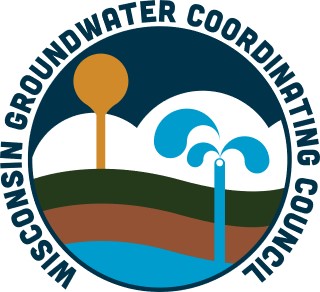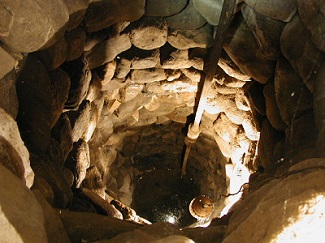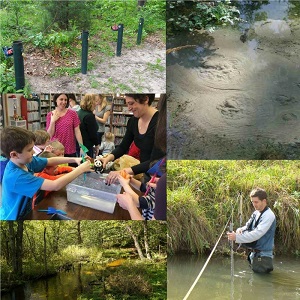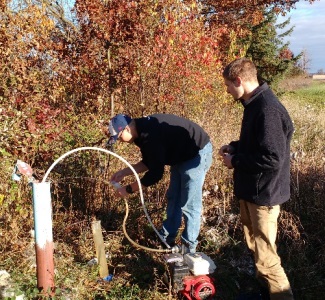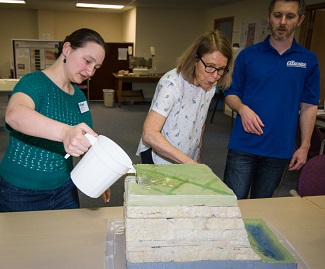Groundwater Coordinating Council Overview
Wisconsin Groundwater Coordinating Council
The Groundwater Coordinating Council (GCC) is an interagency group that is directed by law to assist state agencies in the coordination and exchange of information related to groundwater programs.
Administrative support for the GCC is provided by the Wisconsin Department of Natural Resources. However, the information contained herein does not necessarily reflect the views of the department.
Watch the video to learn more about the GCC.
Purpose
When was the GCC created?
In 1984, the Legislature enacted Wisconsin Act 410 to improve the management of the state’s groundwater. This act required establishment of a Groundwater Coordinating Council (GCC) to be made up of representatives of state agencies with groundwater protection responsibilities.
What is the purpose of the GCC?
The GCC is directed by s. 160.50, Wis. Stats., to “serve as a means of increasing the efficiency and facilitating the effective functioning of state agencies in activities related to groundwater management.” The GCC “advises and assists state agencies in the coordination of non-regulatory programs and the exchange of information related to groundwater, including, but not limited to, agency budgets for groundwater programs, groundwater monitoring, data management, public information and education, laboratory analysis and facilities, research activities and the appropriation and allocation of state funds for research.”
What does the GCC do?
The GCC meets quarterly to discuss issues of interest and make decisions regarding groundwater issues of concern. The following is a sampling of groundwater related activities that the GCC facilitates:
- The GCC coordinates a joint solicitation for groundwater research and monitoring proposals among four state agencies.
- The GCC promotes efforts to enhance the utility of groundwater monitoring and research funded by the state.
- The GCC ensures consistency in groundwater education, data management and mapping efforts.
- The GCC works with representatives of federal and local agencies to promote communication and coordination with state groundwater activities.
- The GCC prepares an annual Report to the Legislature due each August.
- The GCC sponsors and participates in forums and other outreach events to promote discussion of groundwater issues.
Groundwater law
Wisconsin's groundwater law
Wisconsin's groundwater law, Chapter 160, Wisconsin Statutes, established the framework for a comprehensive approach to protect public health and welfare and the environment. The intent of this law is to minimize the concentration of polluting substances in groundwater through the use of numerical standards in all groundwater regulatory programs. The law applies to all groundwater in the state and is used by all state agencies in their regulatory programs that may impact groundwater.
- Learn more about Wisconsin's groundwater law.
- Summary of the law.
Report to the legislature
Annual Report to the Legislature
The Groundwater Coordinating Council is required by s. 15.347, Wis. Stats., to prepare a report which “summarizes the operations and activities of the council..., describes the state of the groundwater resource and its management and sets forth the recommendations of the council. The annual report shall include a description of the current groundwater quality of the state, an assessment of groundwater management programs, information on the implementation of ch. 160, Wis. Stats., and a list and description of current and anticipated groundwater problems.”
A report is due each August for the preceding fiscal year.
Members
GCC members
The GCC consists of high-level administrators of all state agencies with some responsibility for groundwater management plus a Governor's representative. The GCC also has two subcommittees to assist in its work. Additionally, the DNR has one permanent position with half-time responsibilities related to coordination of the GCC.
- View current GCC members.
Subcommittees
GCC subcommittees
The GCC's research efforts touch all corners of
the state. Here, UW-Stevens Point water
resources students explore uranium levels in
groundwater. © William DeVita.The GCC and its subcommittees regularly bring together staff from over 15 different agencies, institutions and organizations to communicate and work together on a variety of research, monitoring and data management, educational and planning issues. A strong network among GCC and subcommittee members leads to coordination across agency lines on a variety of groundwater-related issues. These activities regularly avoid duplication, create efficiencies, and provide numerous benefits to Wisconsin's taxpayers.
Groundwater research and monitoring subcommittee
The GCC is directed to "advise the Secretary of Administration on the allocation of funds appropriated to the Board of Regents of the University of Wisconsin under s. 20.285(1)(a) for groundwater research." Since 1992, a joint solicitation process has facilitated selection and funding of sound scientific research and monitoring to answer state priority needs.
A comprehensive review process including the Groundwater Research Advisory Council (GRAC), the GCC's Monitoring & Research Subcommittee, and outside technical experts resulted in recommendations that were used by the University of Wisconsin System (UWS) and DNR in deciding which groundwater-related proposals to fund.
Educational model of karst topography
demonstrating how water may flow in the
fractured bedrock. © DNR.- Learn more about research and monitoring.
Outreach and partnership subcommittee
Successful groundwater management depends on dispelling myths and fostering public understanding of the resource. Through the cooperation of GCC agency partners, a new generation of students, parents and teachers are more aware of the complex relationship we have with groundwater, our valuable buried treasure. UW-Cooperative Extension - through the UW Water Resources Institute, the Environmental Resources Center and the Wisconsin Geologic and Natural History Survey (WGNHS) - takes the lead for outreach on general groundwater topics while each state agency provides information on their specific regulatory programs. Experience has shown that person-to-person outreach is the best way to engage the public in groundwater protection.
Upcoming meetings
The GCC meets quarterly to discuss issues of interest and make decisions regarding groundwater issues of concern.
Upcoming meetings
Date & Time Location Information Fri. May 9, 2025
10:00 a.m. - 12:00 p.m.Hybrid:
In-Person
TBD- Or -
Remotely
Zoom:
Click here to join the meeting.
Call-In Number: 305-224-1968
Meeting ID: 844 5911 4144- Agenda will be posted closer to meeting date
Fri. Aug. 8, 2025
10:00 a.m. - 12:00 p.m.Hybrid:
In-Person
TBD- Or -
Remotely
Zoom:
Click here to join the meeting.
Call-In Number: 305-224-1968
Meeting ID: 835 3614 1205- Agenda will be posted closer to meeting date
Fri. Nov. 14, 2025
10:00 a.m. - 12:00 p.m.Hybrid:
In-Person (Madison)
TBD- Or -
Remotely
Zoom:
Click here to join the meeting.
Call-In Number: 305-224-1968
Meeting ID: 829 4784 2084- Agenda will be posted closer to meeting date
Past meetings
Past GCC meeting minutes and materials
2025 past meeting materials
2024 meeting minutes
2023 meeting minutes
2022 meeting minutes
2021 meeting minutes
2020 meeting minutes
2019 meeting minutes
- November 2019 minutes [PDF]
- August 2019 minutes [PDF]
- May 2019 minutes [PDF]
- February 2019 minutes [PDF]
2018 meeting minutes
- November 2018 minutes [PDF]
- August 2018 minutes [PDF]
- May 2018 minutes [PDF]
- February 2018 minutes [PDF]
2017 meeting minutes
- November 2017 minutes [PDF]
- August 2017 minutes [PDF]
- May 2017 minutes [PDF]
- February 2017 minutes [PDF]
2016 meeting minutes
2015 meeting minutes
- November 2015 minutes [PDF]
- August 2015 minutes [PDF]
- May 2015 minutes [PDF]
- February 2015 minutes [PDF]
2014 meeting minutes
2013 meeting minutes
- November 2013 minutes [PDF]
- August 2013 minutes [PDF]
- May 2013 minutes [PDF]
- February 2013 minutes [PDF]
2012 meeting minutes and materials
- November 2012 minutes [PDF]
- August 2012 minutes [PDF]
- May 2012 minutes [PDF]
- February 2012 minutes [PDF]
2011 meeting minutes and materials
- November 2011 minutes [PDF]
- August 2011 minutes [PDF]
- May 2011 minutes [PDF]
- February 2011 minutes [PDF]
2010 meeting minutes
- November 2010 minutes [PDF]
- August 2010 minutes [PDF]
- May 2010 minutes [PDF]
- February 2010 minutes [PDF]
2009 meeting minutes

